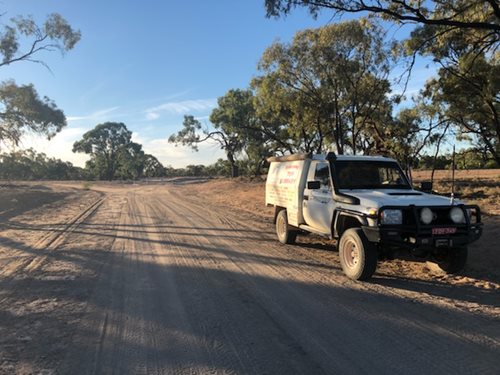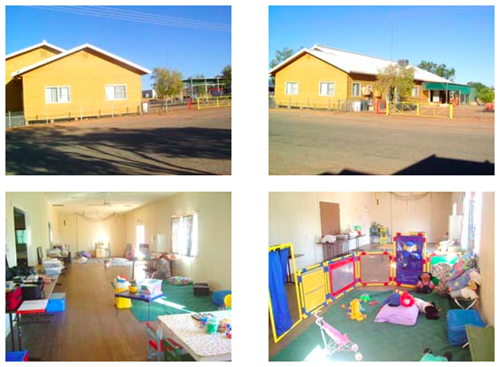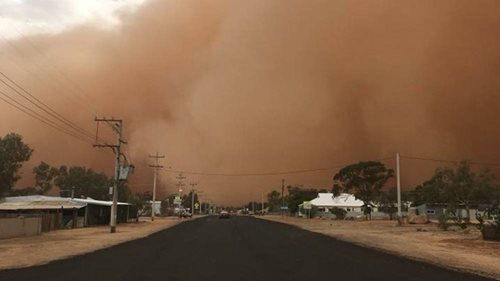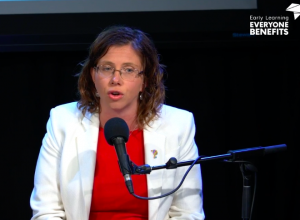Vicki Olds is an early childhood teacher, but lately she’s wondering why.
For years she’s delivered specialised and responsive early childhood education programs to some of Australia’s most remote and vulnerable families as part of the Broken Hill Outback Mobile Resource Unit, a BBF (budget-based funding) service that covers an area of more than 220,000 square kilometres.
Vicki, and a fellow educator, Emma Fenton, load educational resources into their truck and head to halls, parks, sheds and farmhouses on Monday mornings and return on Friday nights. There’s no doubt in their minds that the service they deliver must be primarily early childhood education.
However, the current Australian Government transitioned some BBFs from Education into the Social Service portfolio, and that’s changed things – a lot.
 The Broken Hill Mobile Unit in transit
The Broken Hill Mobile Unit in transit
Outside education
“Since we’re not in the Education portfolio any more, the little recognition there was of my skills as a teacher have been devalued further,” Vicki says.
“Previously we programmed and documented our early education sessions – but now we report on social outcomes through the ‘data exchange’.
“We were a key element in meeting universal access for remote children – but if we aren’t even in the portfolio, where does that leave preschool access for the children living remotely in the 220,000 square kilometres that we serviced?
“I feel like we are a square peg being forced into a round hole.
“I just hope that our most isolated children, who no longer receive an early education program, don’t end up being the square pegs in life as they grow up without the very real benefits of an early education.”
Devalued
CELA CEO Michele Carnegie says Vicky’s not alone in her despair: one of the most valued delivery models for early learning in remote and disadvantaged communities has been lost.
“Mobiles provide a unique opportunity to enhance early educational experiences, provide early intervention and the essential social skills for children in remote areas,” Michele says.
“With AECD figures showing that children living in remote areas are already far behind their urban counterparts, this is an even more serious step backwards.”
 Whitecliffs session setup
Whitecliffs session setup
Social glue
Mobile children’s services are often the social glue of remote areas.
Across Vicki’s region, parents travel up to 150km because they highly value the benefits for their children.
The sessions allow parents to come together and talk about the development of their children, share concerns and support each other.
“It’s also an opportunity for remote parents to learn how to educate their children by observing the work of educators like Vicki and Emma,” Michele says.
“One example is sharing numeracy and literacy games with parents, which means that children keep learning with their families – like counting fence posts when driving through the paddocks.”
Michele says that with limited access to the internet and without the educational know-how, whole families miss out on the skills they need to educationally nurture their children to the same level as less-isolated children.
“This deeply valued and essential educational program has been replaced with a different program driven by loose social outcomes and uncertain funding,” she says.
“Vicki’s service and others like it are essentially in a holding pattern with no idea if funding will continue beyond 12 months.”
Keeping up
The children and families may not see an immediate difference in the service, but the educators and managers are suffering.
“Families who have been surveyed about our service rank it as one of the most crucial services government provides them in these areas,” Vicki says.
“We had built an educational program that worked, and that met the needs of people who are desperate for quality interactions for their children.
“The new department doesn’t understand what we deliver or the difference it makes.
“Many of these preschoolers won’t ever attend a mainstream school before high school – they’ll go onto distance preschool and then school of the air for primary school and possibly boarding school after that.
“Without ever having an early education experience, fitting in or keeping up at school is extremely difficult.”
 February 2019 dust storm
February 2019 dust storm
Data exchange
Instead of the reporting Vicki previously delivered, that was aligned with the National Quality Framework and the Supplementary Regulations, she now uploads sampling information to the Social Services ‘Data Exchange’.
“We don’t really understand how it works, but the end result of the data entry is a ‘social cohesion score’ which allegedly shows how our Mobile Resource Unit has had an impact on people’s lives,” she says.
“The irony is that there’s no room in the data exchange for the real impact we have had.
“The education benefits for children, for example, or the way we deal with natural disasters like massive dust storms and bureaucratic issues with venue problems and continue to meet families who are depending on us.”
Uncertain funding
Vicki says that when under Education the BBF funding was “tight, but at least we knew where we stood”.
Now, however, that sense of stability is gone.
“Worst of all is having no certainty that we can plan for the future,” she says.
“How can we recruit staff that way?
“How can we get any kind of continuity into vulnerable children’s lives?”

Amanda Rishworth at the National Early Childhood Election Forum 2019
ALP attention
While the term ‘vulnerable’ is certainly featured in both ALP and Greens policies, until the National Early Childhood Election Forum there was no mention of the highly specialised problems facing the BBFs.
That changed around the 56 minute mark of the recorded forum, when Shadow Minister for Education Amanda Rishworth committed to reviewing BBF funding – especially the lack of recurrent funding – ‘as a matter of urgency’.
She particularly noted the problems now faced by the BBFs moved out of the Education portfolio and the fact they were now excluded from the little support that might have been available to them under programs like the Community Child Care grants (CCC).
“Many services have been told now they must become viable, and we know they just can’t,” Ms Rishworth said.
Responding to questions from SNAICC’s Geraldine Atkinson, Ms Rishworth was the only speaker able to explain her position on BBFs.
In her reply she also pointed to Labor’s promise of a First Nations Children’s Summit, the difficulties families are facing accessing the Child Care Safety Net payment, and the problems of the current government shifting services to short term funding arrangements.
Promising
It’s the most promising news any former BBF has heard in a long time, although it’s still dependent on Labor taking government and continuing its commitments from before the election.
Michele Carnegie is cautiously optimistic.
“It was very clear from what Shadow Minister Rishworth’s comments she understood BBFs need urgent attention and that means they would be explicitly included in the review of the impact of the current government’s changes on vulnerable children,” she says.
“BBF services were established and funded to meet specific community needs in areas where there was never any likelihood of independent financial viability – this has not changed and the next Australian Government needs to acknowledge this so these services can continue and expand on the extraordinary part they play in early education.”
Related
Create a surprise in your planning